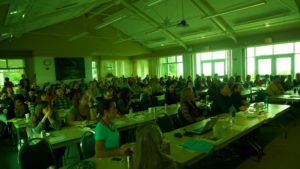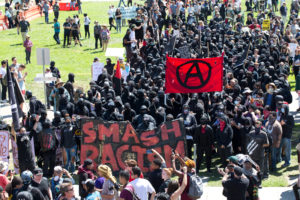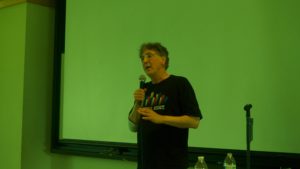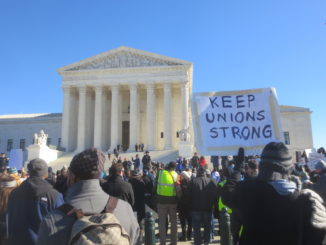Union Victory at CCSF
CFFT’s flex week events kicked off with our part-timers solidarity lunch, which was organized by CCFT’s new adjunct chair and executive board member Katie Woolsey. CCFT’s Wednesday luncheon featured the president of CFT local 212, City College San Francisco faculty Tim Killikelly as a guest speaker. Killikelly is the leader of a robust and activist-oriented local at CCSF. Because of the work of the union, at local, state, and national levels, CCSF remains open today. Local 2121 fought off a ruthless attempt by the ACCJC to close the school in 2012.
Killikelly developed a cogent of analysis of this harrowing, near-death experience at CCSF, an experience that has left the union stronger than before. Social justice unionism was crucial in the struggle. For Killikelly this means that the union is not just looking out for itself. Union issues are social justice issues and the union must look out for the community.
Killikelly narrated the struggle to keep CCSF open. In 2012, rogue accreditor ACCJC put CCSF on show cause; this meant CCSF was just a step away from being shuttered. The state appointed a single trustee, Robert Agrella, to manage the college. He was given, in predictable fashion, extraordinary powers. Without its elected board, CCSF’s new leadership became unaccountable to the community.
Enter the notorious Barbara Beno. She created a new status for CCSF: restoration. This process existed only for CCSF and it required full compliance rather than substantial compliance. This indicated to the union that the college was now subject to extreme scrutiny. Perhaps a single incorrectly written SLO on a syllabus could lead to the loss of accreditation. Complicating all of this was the 40% reduction in enrollment. Amid the general horror, salary cuts were unilaterally imposed as the cost of living continued to skyrocket in San Francisco and all surrounding areas.
Killikelly intoned the slogan of those early days: “Don’t give up, organize!” CFT and AFT stepped in to help. Local 2121 hired two organizers, one to concentrate on internal union organizing and another to handle community organizing. The union developed a determined and militant attitude. Local Democrats offered lukewarm support at best, while faculty were completely fed up with the situation.
 City Dennis Herrera finally sued to prevent closure. At trial he showed illegal action by ACCJC, which in turn brought other politicians onto the side of CCSF. The worst moment in the college’s history turned miraculously into the best—and Killikelly mentioned several lows. On one ordinary Friday, faculty were told the Civic Center campus in the Tenderloin would close the following Monday. Local 2121 got Supervisor Jane Kim involved and things were turned around. Last year saw another win. Prop W, transfer tax property sales over five million dollars, has now increased access to education by using tax funds to provide tuition-free city college for San Francisco residents. This 2017 fall semester has seen a 24% percent enrollment increase.
City Dennis Herrera finally sued to prevent closure. At trial he showed illegal action by ACCJC, which in turn brought other politicians onto the side of CCSF. The worst moment in the college’s history turned miraculously into the best—and Killikelly mentioned several lows. On one ordinary Friday, faculty were told the Civic Center campus in the Tenderloin would close the following Monday. Local 2121 got Supervisor Jane Kim involved and things were turned around. Last year saw another win. Prop W, transfer tax property sales over five million dollars, has now increased access to education by using tax funds to provide tuition-free city college for San Francisco residents. This 2017 fall semester has seen a 24% percent enrollment increase.
Far Right Back in the Bay Area
Flex week this year fell before two right-wing political demonstrations planned in San Francisco and Berkeley. I asked Killikelly about the union’s organizing with counter demonstrators in San Francisco. His response was, “Don’t be silent!” After all, the far right is the mortal enemy of the teachers’ unions. Local 2121 members were organizing a march from Harvey Milk Plaza to Civic center on Saturday. Killikelly emphasized the messaging and the framing for the march: challenging white supremacy. White supremacy isn’t just hoods and Nazis—it’s there in daily life, encoded into our public institutions, into voter suppression. It means no healthcare for low-income communities of color. White supremacy is California housing covenants often written into the property deed. San Francisco mayor Ed Lee wanted a message that the rally at the civic center was above politics—but labor countered with a militant, anti-racist message.
 The fascists who marched through Charlottesville were a no show in the Bay Area. The confrontational outlook of labor and the far left was obviously intimidating. Counterdemonstrators were out in force. ILWU Local 10, with its long militant history, led a march to Crissy field on Saturday. Meanwhile a diverse group gathered in Berkeley on Sunday, with labor, peace, and mass socialist organizations in the mix. The most visible element of the march in the media narrative was the hundreds-strong “black bloc” of antifascist demonstrators. The Democratic Socialists of America (DSA) also brought a large contingent to the demo.
The fascists who marched through Charlottesville were a no show in the Bay Area. The confrontational outlook of labor and the far left was obviously intimidating. Counterdemonstrators were out in force. ILWU Local 10, with its long militant history, led a march to Crissy field on Saturday. Meanwhile a diverse group gathered in Berkeley on Sunday, with labor, peace, and mass socialist organizations in the mix. The most visible element of the march in the media narrative was the hundreds-strong “black bloc” of antifascist demonstrators. The Democratic Socialists of America (DSA) also brought a large contingent to the demo.
At the end of September, the far right came back to Berkeley, this time on campus at Cal. Already the university has spent precious campus funds so Ben Shapiro, a conservative “mind,” could speak on campus with a large contingent of police security. A planned far-right “free speech” week appears to fizzling out. A right wing group on campus had hoped to bring Erik Prince (the founder of mercenary army Blackwater), Steve Bannon, and a grab bag of other reactionaries. In response, some faculty members are calling for a boycott of classes during the right-wing “free speech” week (September 24-27).
The situation at Cal, though exceptional, reveals a general dynamic. Higher education—its autonomy of classroom instruction, its scholarly mandates, its strong voice on the political margins—is now in the crosshairs of a small but motivated right wing activist movement. Now is the time to get prepared for right wing activity on our own campuses.





